
Goanna is an Australian rock band which formed in 1977 in Geelong as The Goanna Band with mainstay Shane Howard as singer-songwriter and guitarist. The group integrated social protest with popular music and reached the Top 20 on the Australian Kent Music Report Singles Chart with "Solid Rock" (1982) and "Let the Franklin Flow". Their debut album, Spirit of Place, peaked at No. 2 on the related albums chart. They disbanded in 1987 and briefly reformed in 1998.

"Walking on the Moon" is a reggae song by British rock band the Police, released as the second single from their second studio album, Reggatta de Blanc (1979). The song was written by the band's lead vocalist and bassist Sting. It went on to become the band's second No. 1 hit in the UK.

"Unchain My Heart" is a song written by Bobby Sharp and recorded first in 1961 by Ray Charles and in 1963 by Trini Lopez and later by many others. Sharp, a drug addict at the time, sold the song to Teddy Powell for $50. Powell demanded half the songwriting credit. Sharp later successfully fought for the rights to his song. In 1987, he was also able to renew the copyright for his publishing company, B. Sharp Music.
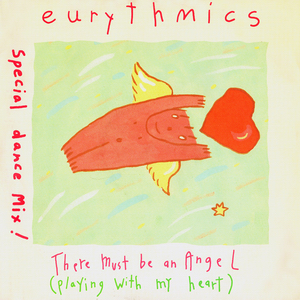
"There Must Be an Angel (Playing with My Heart)" is a song by the British musical duo Eurythmics, released as the second single from their fifth studio album, Be Yourself Tonight (1985). It features a harmonica solo by American musician Stevie Wonder. The song became a worldwide success; most notably in Ireland, Norway and the United Kingdom, where it remains the duo's only chart-topper.
Machinations are an Australian synthpop band which formed in 1980. They reached the top 20 on the Kent Music Report albums chart with Big Music in 1985. Their top 30 hits on the related singles chart are "Pressure Sway", "No Say in It", "My Heart's On Fire" and "Do to You". By 1989 the group had disbanded. They briefly reunited in 1997 and then reformed in 2012.

"State of the Heart" is a song written by Eric McCusker. In Australia, it is best known for being recorded by Australian rock group Mondo Rock ; the track was released in October 1980 as the lead single from the band's second studio album, Chemistry (1981), and peaked at number 6 on the Australian Kent Music Report.

"He's Gonna Step on You Again" is a song originally performed by John Kongos, co-written by Kongos and Christos Demetriou, and first released in 1971 by Fly Records. It entered the UK Singles Chart on 22 May 1971 and spent 14 weeks there, peaking at No. 4. Covers of the song have been chart successes several times, including for Happy Mondays in 1990.

"Where Did Your Heart Go?" is a song written by American musicians David Was and Don Was. The song was recorded and released by the writers' band Was as a single in the UK as a double A-side with "Wheel Me Out" in September 1981. The single did not chart. It is featured as the second track on the band's debut album Was in August 1981. French editions of the single include the track "It's an Attack!" as the B-side.
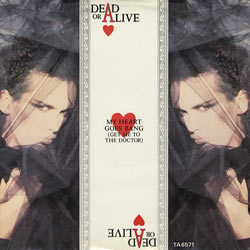
"My Heart Goes Bang (Get Me to the Doctor)" is a 1985 song by English pop band Dead or Alive. It was the fourth and final single from the band's second studio album Youthquake. It peaked at No. 23 in the United Kingdom, No. 12 in Japan, and became a dance hit in the U.S.
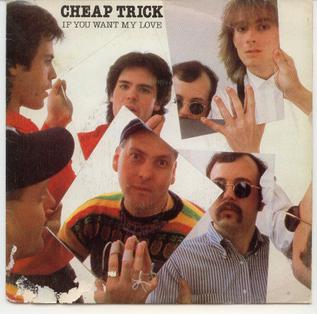
"If You Want My Love" is a song by American rock band Cheap Trick, released in 1982 as the lead single from their sixth studio album One on One. It was written by guitarist Rick Nielsen and produced by Roy Thomas Baker. It reached number 45 on the US Billboard Hot 100 and number 2 on the Australian Kent Music Report chart.
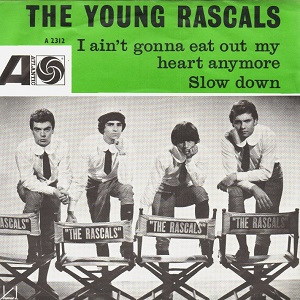
"I Ain't Gonna Eat Out My Heart Anymore" is a song written by Pam Sawyer and Laurie Burton in 1965. Originally envisioned to be recorded by a British Invasion artist, the song was extremely well liked by American rock group the Young Rascals, and they subsequently recorded the song and released it as their debut single in November 1965 through Atlantic Records. Though only a marginal hit, reaching number 52 on the Billboard Hot 100, it largely established the band on the American music scene. It has since been included on several albums by the band, including their eponymous debut album, and several compilation albums, including Time Peace: The Rascals' Greatest Hits, on which it was the opening track.

"Solid Rock" is a song written by Shane Howard and recorded by Australian rock band Goanna. The song deals with issues of land rights for Indigenous Australians and was released in September 1982 as the lead single from the band's debut studio album, Spirit of Place. "Solid Rock" peaked at number 3 on the Australian Kent Music Report.

"Just Like Fire Would" is a song by Australian alternative rock band, the Saints, which is written by the band's lead singer, Chris Bailey, and was released as a single in March 1986. It was the lead single from their seventh studio album, All Fools Day, and peaked at No. 29 on the Kent Music Report Singles Chart. It was produced by Hugh Jones, who had co-produced the album with Bailey. AllMusic's John Dougan reviewed All Fools Day and opined, "One listen to songs as grabbing as 'Celtic Ballad' or the great 'Just Like Fire Would' will convince you that despite the differences, the new Saints were a good band for completely different reasons than the old Saints."

"One Way Ticket" is a song written by Jack Keller and Hank Hunter. It was originally performed by American singer Neil Sedaka and popularized by British disco band Eruption.
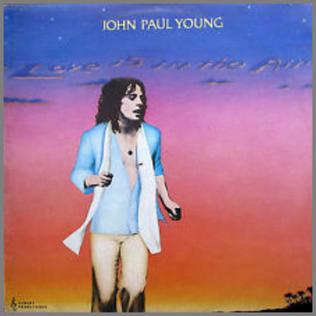
Love Is in the Air is the fourth studio album by Australian pop singer John Paul Young, released in 1978. The album was produced by Vanda & Young and released through Albert Productions. It peaked at number 32 in Australia. The album spawned the singles "Love Is in the Air", "The Day That My Heart Caught Fire", "Lost in Your Love" and "Fool in Love".
"The Day That My Heart Caught Fire" is a pop song written by Harry Vanda and George Young. It was recorded by Australian pop singer John Paul Young. The song was released in August 1978 as the second single from Young's fourth studio album Love Is in the Air (1978). The song peaked at number 20 on the Kent Music Report in October 1978.
"Young Hearts" is a song written by Roger Hart-Wells and David Crosbie and recorded by Australian band Little Heroes. The song was released in July 1982 as the second single from the band's second studio album, Play by Numbers (1982). The single peaked on the Australian Kent Music Report at #42.

"No Second Prize" is the debut single by Scottish-born Australian rock musician Jimmy Barnes, released in August 1984 as the lead single from his debut studio album, Bodyswerve. It peaked at number 12 on the Australian Kent Music Report. The song was originally demoed by Cold Chisel but never recorded by them. It was written in 1980 as a tribute to Chisel roadies Alan Dallow and Billy Rowe, who died in a truck crash.
"Everyday of My Life" is a song by Australian band Little River Band, released in April 1976 as the first and only single from the group's second studio album, After Hours. The song peaked at number 29 on the Australian Kent Music Report singles chart.

"Total Control" is a song by American new wave band the Motels. It was released in 1979 as the second single from their debut studio album Motels. The song failed to make an appearance on the US Billboard Hot 100, but reached number 9 on the Bubbling Under the Hot 100 chart in December 1979. It fared better in Australasia, peaking at number 7 in Australia and 11 in New Zealand. The song has been covered by American singer Tina Turner and Australian singer Missy Higgins.
















